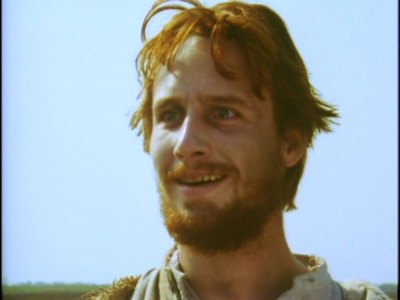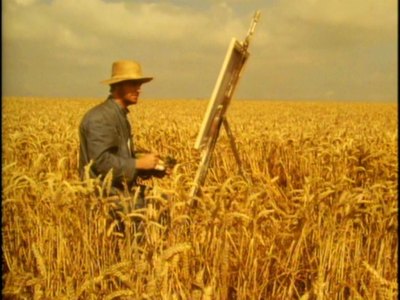| Reviews & Columns |
|
Reviews DVD TV on DVD Blu-ray 4K UHD International DVDs In Theaters Reviews by Studio Video Games Features Collector Series DVDs Easter Egg Database Interviews DVD Talk Radio Feature Articles Columns Anime Talk DVD Savant Horror DVDs The M.O.D. Squad Art House HD Talk Silent DVD
|
DVD Talk Forum |
|
|
| Resources |
|
DVD Price Search Customer Service #'s RCE Info Links |
|
Columns
|
|
|
Van Gogh
BBC Video has released Van Gogh, a 1990 TV biopic of the great artist, that originally ran as part of Omnibus, a popular British dramatic anthology series. Written by Patrick Barlow, and starring Linus Roache as the tormented painter, Van Gogh is at times quite an absorbing look at the mad genius, deploying a fractured narrative structure that mirrors the generally accepted notion of Van Gogh's mental state.

While it's not within the scope of this review to recount the event-filled life of Vincent Van Gogh, I would imagine that most people are familiar with the broad signposts of his life: his early work with art dealers in The Netherlands; his failed careers in education and the ministry; his eventual move into painting, and his years of financial, artistic, and emotional suffering that went along with that career; his terrifically close relationship with his brother, Theo, who bankrolled Vincent during his later years of painting; Van Gogh's failed artist/friend relationship with fellow painter Paul Gaugin; and his subsequent mental breakdowns and eventual suicide.
Van Gogh touches on all these themes, but it's far more interested in presenting an emotional view of the artist, rather than a strictly biographical one. Not unlike director Vincent Minnelli's classic exploration of the painter, Lust for Life, Van Gogh sees Vincent's madness as the central motivating factor for not only his life, but also his work. But whereas Lust for Life follows a strict chronological order, and concerns itself as much with the actual process of painting that Van Gogh utilized, to tell its story, Van Gogh jumps around in time, repeating seemingly inexplicable sequences over and over again, until they finally make sense at the end of the film. As well, Van Gogh doesn't seem too terribly interested in the actual process of Vincent's work, or the results for that matter, either. Van Gogh's personal demons, and his relationship with his brother Theo are the main focus here.
What I found interesting about Van Gogh was this resolutely focused look at Van Gogh the man, and his inner turmoil. His paintings rarely show up, and as for solid biographical facts, Van Gogh is much more interested in letting the audience try and sort their way through the jumble of various flashforwards and flashbacks to get at the essence of the character. The audience is frequently at a loss to fully understand if a particular scene is "true," or factual, or if it's a scene out of Vincent's fevered brain. There's an irreverence, a humor, to many of the scenes in Van Gogh that I also found refreshing. Director Anna Benson Gyles isn't afraid to show Vincent as totally wigged out, and the resulting oddity of his personality easily lends itself to humorous exchanges with the other characters (Van Gogh's nighttime entry into Gaugin's bedroom is both funny and scary).
Linus Roache as Van Gogh is immediately compelling, probably because he's not afraid, either, to show Van Gogh as totally off the beam. Whether that jibes with the reality of Van Gogh's life is another story (there are as many theories about his mental state as there are experts to propose them), but in trying to capture a state of growing mental unbalance, Roache and Van Gogh is quite successful. As well, Kevin Wallace has a nice chemistry with Roache, creating a believable, caring portrait of the supportive, sensitive Theo.
What doesn't work with Van Gogh are the frequent attempts to deliver exposition on the life of Vincent, complete with ominous foreshadowing, in the guise of a modern character or a incongruous flashforward sequence. There's a scene where Vincent's father tells the young boy the whole sequence of his upcoming life, complete with final suicide attempt, that's remarkably amateurish in intent and execution. Toulouse Lautrec shows up, and keeps urging Vincent to get to the insane asylum, only to have Vincent correct him, saying there are other things in his life that have to happen first. Most ridiculous is a totally inexplicable appearance by a modern newscaster (she literally pops up out of a wheat field), telling us some tidbits about the painter's life. Why anyone involved in Van Gogh would think those scenes would work is beyond me, but they do tend to break up the interesting tapestry of the editorial scheme.

The DVD:
The Video:
The full screen, 1.33:1 video image for Van Gogh isn't the greatest, with grain and a perceptible fade to the colors.
The Audio:
The Dolby Digital English 2.0 stereo audio mix is adequate for the demands of this largely dialogue-driven film. Close-captioning is available.
The Extras:
There are no extras for Van Gogh.
Final Thoughts:
An intriguingly fractured narrative and an interpretation of Van Gogh as decidedly unbalanced from the get-go, make Van Gogh an compelling examination of the painter, particularly for those who have seen Lust for Life enough times. Not all of it works, but the lead performance is quite interesting, and the focus of the film is nicely obscured until the end. I recommend Van Gogh.
Paul Mavis is an internationally published film and television historian, a member of the Online Film Critics Society, and the author of The Espionage Filmography .


|
| Popular Reviews |
| Sponsored Links |
|
|
| Sponsored Links |
|
|
| Release List | Reviews | Shop | Newsletter | Forum | DVD Giveaways | Blu-Ray | Advertise |
|
Copyright 2024 DVDTalk.com All Rights Reserved. Legal Info, Privacy Policy, Terms of Use,
Manage Preferences,
Your Privacy Choices | |||||||













